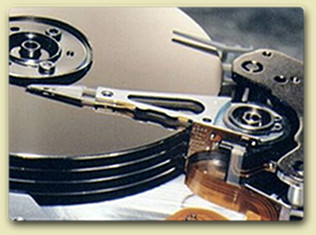Data Backup Systems & Solutions
Having a backup solution to protect the vital files on your computer is one of the most important aspects of being a
protected computer user. Vital files include documents that you create as well as other unique files such as
photos, music, email, and presentations. Backups are particularly important for business documents,
research projects or business proposals that can represent weeks or months of work, and that can be nearly impossible
to recreate. Digital cameras make backup systems vital to everyone who takes pictures. Who wants to lose those
memories?
Backup solutions can take many different forms, and are relatively easy and inexpensive with the
availability of today's hardware and software. The right answer is the one that suits your needs,
and we can help you find it, implement it, and automate it. Don't wait until you have a catastrophic
disk drive failure to realize the importance of backing up your data.
And yes, some day your drive will fail. We all die eventually, even our cyberselves.
Let Altitude Data implement a customized backup solution specifically for you.
Data Backup Solutions
We can recommend additional software you may not be aware of to optimize your system safety.
In some
infections, or
for other reasons, data may already be lost before we arrive. We do not offer clean room services, but
in many cases can still recover data you thought was lost. This depends largely on how long it has been
since you lost it. If you need data recovery, call us today, or it could be gone forever.
Data Backup and Recovery Methods
Unstructured
An unstructured repository may simply be a stack of floppy disks or CD-R/DVD-R media with minimal information about
what was backed up and when. This is the easiest to implement, but probably the least likely to achieve a high level
of recoverability.
Full Backup
A backup in which all of a defined set of data objects are copied, regardless of whether they have been modified
since the last backup. A full backup is the basis from which incremental backups are taken.
Full Plus Incremental Backup
A Full Plus Incremental backup aims to make storing several copies of the source data more feasible. At first, a
full backup of all files is taken. After that, any number of incremental backups can be taken. There are many
different types of incremental backups, but they all attempt to only backup a small amount of data relative to the
full backup. Restoring a whole system to a certain point in time would require locating the full backup taken
previous to that time and the incremental backups that cover the period of time between the full backup and the
particular point in time to which the system is supposed to be restored. The scope of an incremental backup is
typically defined as a range of time relative to other full or incremental backups. Different implementations of
backup systems frequently use specialized or conflicting definitions of these terms.
Typical Data Backup Storage Media
External Hard Disk
The capacity/price ratio of external hard disk backup has been rapidly improving for many years. This is making
it more competitive with magnetic tape as a bulk storage medium. The main advantages of hard disk storage are
low access times, availability, capacity and ease of use. External disks can be connected via local interfaces
like SCSI, USB, FireWire, or eSATA, or via longer distance technologies like Ethernet, iSCSI, or Fibre Channel.
Some disk-based backup systems, such as Virtual Tape Libraries, support data de-duplication which can dramatically
reduce the amount of disk storage capacity consumed by daily and weekly backup data.
Optical Disc
A recordable CD can be used as a backup device. One advantage of CDs is that they can in theory be restored on
any machine with a CD-ROM drive. (In practice, writable CD-ROMs are not always universally readable.) In addition,
recordable CD's are relatively cheap. Another common format is recordable DVD. Many optical disk formats are WORM
type, which makes them useful for archival purposes since the data can't be changed. Other rewritable formats can
also be utilized such as CD-RW or DVD-RAM. The newer HD-DVDs and Blu-ray Discs dramatically increase the amount of
data possible on a single optical storage disk, though, as yet, the media may be cost prohibitive for many people.
Additionally the physical lifetime of the optical disk has become a concern as it is possible for some optical disks
to degrade and lose data within a couple of years.
Floppy Disk
During the 1980s and early 1990s, many personal/home computer users associated backup mostly with copying floppy
disks. The low data capacity of a floppy disk makes it an unpopular and obsolete choice today.
Solid State Storage
Also known as flash memory, thumb drives, USB flash drives, CompactFlash, SmartMedia, Memory Stick, Secure Digital
cards, etc., these devices are relatively costly for their low capacity, but offer excellent portability and
ease-of-use, though they are impractical for full system backups.
Remote Backup Service
As broadband Internet access becomes more widespread, remote backup services are gaining in popularity. Backing up
via the Internet to a remote location can protect against some worst-case scenarios such as fires, floods, or
earthquakes which would destroy any backups in the immediate vicinity along with everything else. There are, however,
a number of drawbacks to remote backup services. First, internet connections (particularly domestic broadband
connections) are generally substantially slower than the speed of local data storage devices, which can be a problem
for people who generate or modify large amounts of data. Secondly, users need to trust a third party service provider
with both privacy and integrity of backed up data. The risk associated with putting control of personal or sensitive
data in the hands of a third party can be managed by encrypting sensitive data so that its contents cannot be viewed
without access to the secret key. Ultimately the backup service must itself be using one of the above methods, so
this could be seen as a more complex way of doing traditional backups.
As you can see there are a number of possible solutions and we didn't even cover them all. We will meet with you
personally and design the most efficient and cost effective solution around your specific needs. Let the experts
at Altitude Data help you secure and protect your data.

 Save Up to 25% -
Check out our new Prepaid Service Plan
or, the ideal gift, our Gift of Service Plan
Save Up to 25% -
Check out our new Prepaid Service Plan
or, the ideal gift, our Gift of Service Plan


